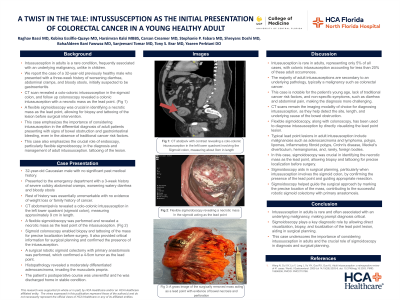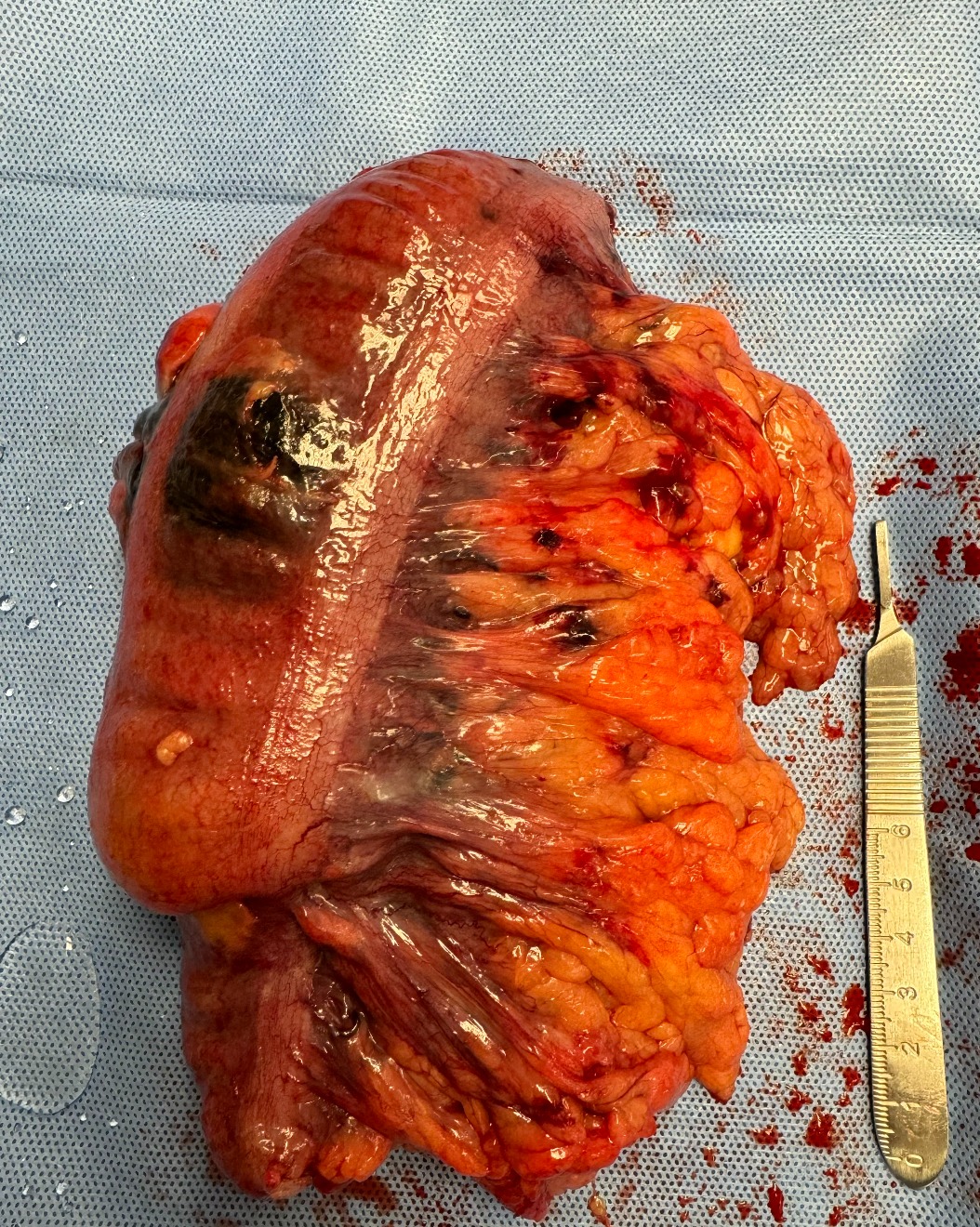Monday Poster Session
Category: Colon
P2066 - A Twist in the Tale: Intussusception as the Initial Presentation of Colon Cancer in a Young Healthy Adult
Monday, October 28, 2024
10:30 AM - 4:00 PM ET
Location: Exhibit Hall E

Has Audio

Raghav Bassi, MD
University of Central Florida College of Medicine
Gainesville, FL
Presenting Author(s)
Raghav Bassi, MD1, Stephanie P.. Fabara, MD1, Harsimran Kalsi, MBBS1, Carson Creamer, MD1, Kobina Essilfie-Quaye, MD1, Shreyans Doshi, MD2, Baha Aldeen Bani Fawwaz, MD3, Sanjeevani Tomar, MD3, Tony S.. Brar, MD1, Yaseen Perbtani, DO1
1University of Central Florida College of Medicine, Gainesville, FL; 2Wake Forest University School of Medicine, Charlotte, NC; 3AdventHealth, Orlando, FL
Introduction: Intussusception rarely presents in adults with 90% of cases being associated with an underlying malignant neoplasm as the lead point. The clinical presentation of this disease is non-specific making diagnosis and management challenging. Symptoms include cramping abdominal pain, bowel obstruction, vomiting, bloating, or bloody stools.
Case Description/Methods: A 32-year-old Caucasian male with no significant past medical history presented to the emergency department with a three-week history of worsening watery diarrhea following sick contact with his daughter. While other family members recovered, his symptoms worsened, and he began experiencing severe intermittent abdominal cramps, with associated bloody diarrhea. He denied any unintentional weight loss, family history of colon cancer, smoking cigarettes, or alcohol use. Physical examination revealed tenderness in the lower abdomen without rigidity or rebound. A computed tomography (CT) of the abdomen and pelvis with contrast revealed evidence of a colo-colonic intussusception in the left lower quadrant involving the sigmoid colon, measuring approximately 9 cm long. The gastroenterology team was consulted and the patient underwent a flexible sigmoidoscopy which revealed a colo-colonic intussusception with a necrotic mass as the lead point. The necrotic mass was biopsied and tattooed. The surgical oncology team was then consulted and a robotic sigmoid colectomy with primary anastomosis was performed. Operative findings revealed bowel obstruction caused by a colonic intussusception at the sigmoid colon with perforation (Fig 1). The lead point was identified as a tumor measuring 4-5 cm. Histopathological examination confirmed a moderately differentiated adenocarcinoma located in the sigmoid colon, invading the muscularis propria. The patient's postoperative recovery was uneventful and he was discharged home.
Discussion: Colo-colonic intussusception is an extremely rare pathology accounting for less than 20% of all intussusception cases. This case is unique in that our patient’s diagnosis of colon cancer was found after he presented with an intussusception. Furthermore, his non-specific presentation in the setting of a recent sick contact, coupled with his young age, and lack of family history of colon cancer is not particularly concerning for occult malignancy. CT scans of the abdomen are the imaging test of choice because they can help with staging, location and the nature of the mass.

Disclosures:
Raghav Bassi, MD1, Stephanie P.. Fabara, MD1, Harsimran Kalsi, MBBS1, Carson Creamer, MD1, Kobina Essilfie-Quaye, MD1, Shreyans Doshi, MD2, Baha Aldeen Bani Fawwaz, MD3, Sanjeevani Tomar, MD3, Tony S.. Brar, MD1, Yaseen Perbtani, DO1. P2066 - A Twist in the Tale: Intussusception as the Initial Presentation of Colon Cancer in a Young Healthy Adult, ACG 2024 Annual Scientific Meeting Abstracts. Philadelphia, PA: American College of Gastroenterology.
1University of Central Florida College of Medicine, Gainesville, FL; 2Wake Forest University School of Medicine, Charlotte, NC; 3AdventHealth, Orlando, FL
Introduction: Intussusception rarely presents in adults with 90% of cases being associated with an underlying malignant neoplasm as the lead point. The clinical presentation of this disease is non-specific making diagnosis and management challenging. Symptoms include cramping abdominal pain, bowel obstruction, vomiting, bloating, or bloody stools.
Case Description/Methods: A 32-year-old Caucasian male with no significant past medical history presented to the emergency department with a three-week history of worsening watery diarrhea following sick contact with his daughter. While other family members recovered, his symptoms worsened, and he began experiencing severe intermittent abdominal cramps, with associated bloody diarrhea. He denied any unintentional weight loss, family history of colon cancer, smoking cigarettes, or alcohol use. Physical examination revealed tenderness in the lower abdomen without rigidity or rebound. A computed tomography (CT) of the abdomen and pelvis with contrast revealed evidence of a colo-colonic intussusception in the left lower quadrant involving the sigmoid colon, measuring approximately 9 cm long. The gastroenterology team was consulted and the patient underwent a flexible sigmoidoscopy which revealed a colo-colonic intussusception with a necrotic mass as the lead point. The necrotic mass was biopsied and tattooed. The surgical oncology team was then consulted and a robotic sigmoid colectomy with primary anastomosis was performed. Operative findings revealed bowel obstruction caused by a colonic intussusception at the sigmoid colon with perforation (Fig 1). The lead point was identified as a tumor measuring 4-5 cm. Histopathological examination confirmed a moderately differentiated adenocarcinoma located in the sigmoid colon, invading the muscularis propria. The patient's postoperative recovery was uneventful and he was discharged home.
Discussion: Colo-colonic intussusception is an extremely rare pathology accounting for less than 20% of all intussusception cases. This case is unique in that our patient’s diagnosis of colon cancer was found after he presented with an intussusception. Furthermore, his non-specific presentation in the setting of a recent sick contact, coupled with his young age, and lack of family history of colon cancer is not particularly concerning for occult malignancy. CT scans of the abdomen are the imaging test of choice because they can help with staging, location and the nature of the mass.

Figure: Fig 1: A gross image of the surgically removed mass acting as a lead point with evidence of bowel necrosis and perforation.
Disclosures:
Raghav Bassi indicated no relevant financial relationships.
Stephanie Fabara indicated no relevant financial relationships.
Harsimran Kalsi indicated no relevant financial relationships.
Carson Creamer indicated no relevant financial relationships.
Kobina Essilfie-Quaye indicated no relevant financial relationships.
Shreyans Doshi indicated no relevant financial relationships.
Baha Aldeen Bani Fawwaz indicated no relevant financial relationships.
Sanjeevani Tomar indicated no relevant financial relationships.
Tony Brar indicated no relevant financial relationships.
Yaseen Perbtani indicated no relevant financial relationships.
Raghav Bassi, MD1, Stephanie P.. Fabara, MD1, Harsimran Kalsi, MBBS1, Carson Creamer, MD1, Kobina Essilfie-Quaye, MD1, Shreyans Doshi, MD2, Baha Aldeen Bani Fawwaz, MD3, Sanjeevani Tomar, MD3, Tony S.. Brar, MD1, Yaseen Perbtani, DO1. P2066 - A Twist in the Tale: Intussusception as the Initial Presentation of Colon Cancer in a Young Healthy Adult, ACG 2024 Annual Scientific Meeting Abstracts. Philadelphia, PA: American College of Gastroenterology.
